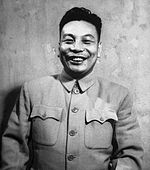Chiang Ching-kuo, Date of Birth, Place of Birth, Date of Death
TweetChiang Ching-kuo
President of the Republic of China (Taiwan)
 Date of Birth: 27-Apr-1910
Date of Birth: 27-Apr-1910
 Place of Birth: Zhejiang, China
Place of Birth: Zhejiang, China
Date of Death: 13-Jan-1988
Profession: politician
Zodiac Sign: Taurus 
About Chiang Ching-kuo
- Chiang Ching-kuo (27 April 1910 – 13 January 1988) was a politician of the Republic of China.
- The eldest and only biological son of former president Chiang Kai-shek, he held numerous posts in the government of the Republic of China.
- He served as Premier of the Republic of China between 1972–78 and was the President of the Republic of China from 1978 until his death in 1988. Chiang Ching-kuo was sent as a teenager to study in the Soviet Union during the First United Front in 1925, when his father's Nationalist Party and the Chinese Communist Party were in alliance.
- He attended university there, but when the Chinese Nationalists violently broke with the Communists, Stalin sent him to work in a steel factory in the Ural Mountains.
- There he met and married Faina Vakhreva.
- When war between China and Japan was imminent in 1937, Stalin sent the couple to China.
- During the war his father gradually came to trust Ching-kuo and gave him more and more responsibilities, including administration.
- After the Japanese surrender, Chiang-kuo was given the job of ridding Shanghai of corruption, which he attacked with ruthless efficiency.
- The victory of the Communists in 1949 drove the Chiangs and their goverment to Taiwan.
- Chiang Ching-kuo was first given control of the secret police, a position he retained until 1965 and in which he used arbitrary arrests and torture to ensure tight control.
- He then became Minister of Defense 1965-1969, Vice-Premier, 1972-78, Premier, 1972-78.
- After his father's death in 1976 he took leadership of the Nationalist Party as Chairman, and was elected President of the Republic in 1978.
- Under his tenure, the government of the Republic of China, while authoritarian, became more open and tolerant of political dissent.
- Chiang courted Taiwanese voters and reduced the preference for those who had come from the mainland after the war.
- Towards the end of his life, Chiang relaxed government controls on the media and speech and allowed Taiwanese Han into positions of power, including his successor Lee Teng-hui.
Read more at Wikipedia

